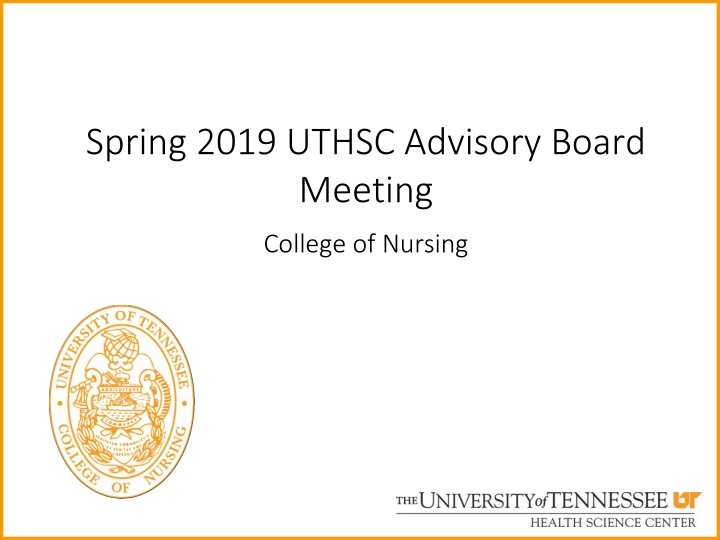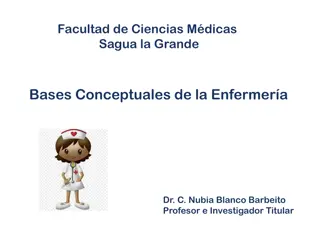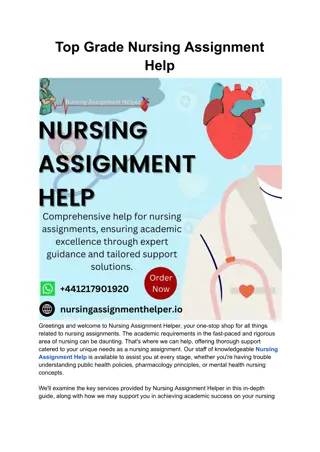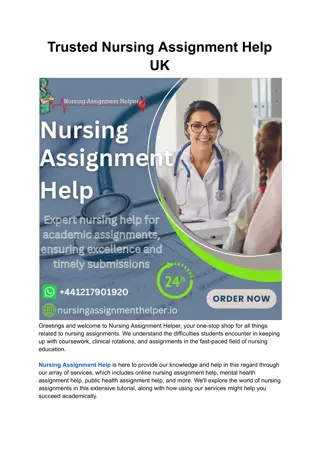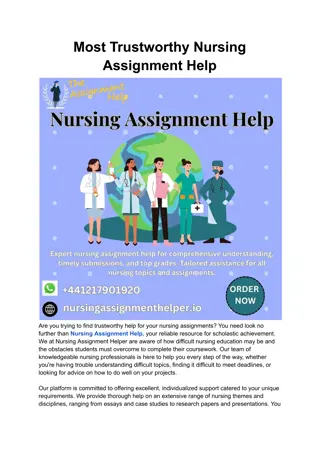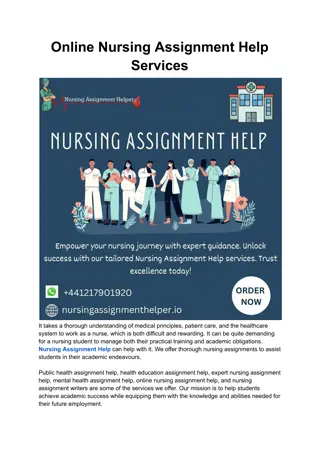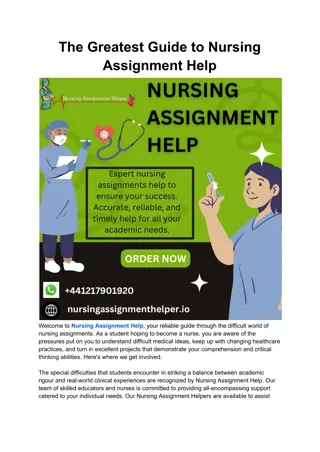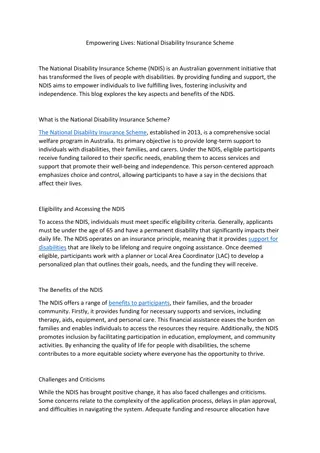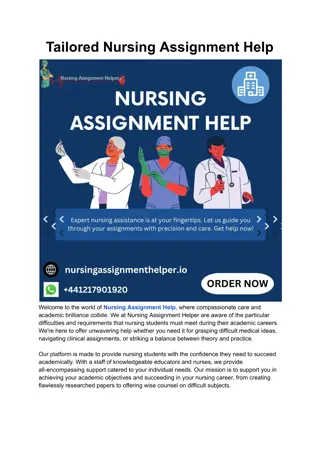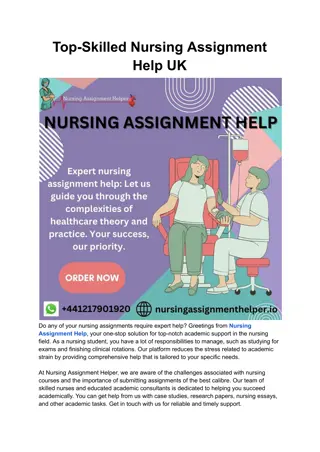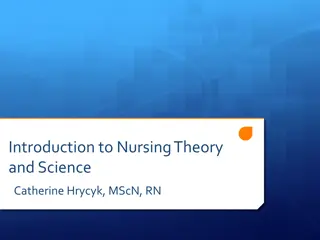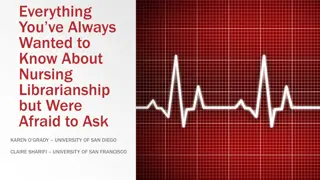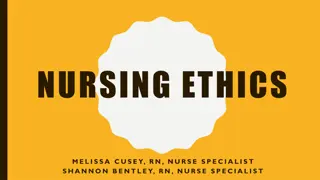UTHSC College of Nursing Enrollment Trends and Demographics 2018-2019
Enrollment data and demographic breakdowns for UTHSC College of Nursing in the years 2018-2019 are presented. The information includes graduation rates, new student profiles, DNP program enrollment, student demographics by gender, race, program, and performance metrics like average GPA and pass rates for NCLEX and DNP certifications.
Download Presentation

Please find below an Image/Link to download the presentation.
The content on the website is provided AS IS for your information and personal use only. It may not be sold, licensed, or shared on other websites without obtaining consent from the author.If you encounter any issues during the download, it is possible that the publisher has removed the file from their server.
You are allowed to download the files provided on this website for personal or commercial use, subject to the condition that they are used lawfully. All files are the property of their respective owners.
The content on the website is provided AS IS for your information and personal use only. It may not be sold, licensed, or shared on other websites without obtaining consent from the author.
E N D
Presentation Transcript
Spring 2019 UTHSC Advisory Board Meeting College of Nursing
2018-2019 CON Graduation & Enrollment PROGRAM GRADUATES May 2018 TOTAL ENROLLMENT BSN RN BSN DNP RNFA Certificate Programs PhD Total 43 158 1 7 74 243 3 0 1 4 1 11 122 424 December 2018 BSN RN BSN DNP RNFA Certificate Programs PhD Total 76 186 2 6 20 250 0 0 0 2 2 21 99 467 May 2019 BSN (projected) RN BSN (projected) DNP (projected) RNFA (9 already counted in DNP) Certificate Programs PhD (projected) Total 33 100 3 4 66 223 10 0 0 1 4 21 103 353
Fall 2019 New Student Profile: All Programs Program Students 64 BSN 15 RN-BSN 91 DNP 22 DNP Nurse Anesthesia 6 RNFA Certificate 1 Post DNP PMHNP Certificate 2 Post DNP Pediatric Primary Certificate 1 Post MSN AG-ACNP Certificate 202 TOTAL INCOMING STUDENTS
DNP New Enrollment Doctor of Nursing Practice- APRN Family Nurse Practitioner (FNP) 20 Psych Mental Health Nurse Practitioner (PMH) 18 Acute Gero Nurse Practitioner (AGACNP) 25 Dual FNP/ PMH 9 Dual FNP/ AGACNP 7 Neonatal Nurse Practitioner 1 Pediatric Primary Care Nurse Practitioner 3 Pediatric Acute Care Nurse Practitioner 8 Total 91
New Student Demographics CRNA DNP/Certs BSN Gender Gender Gender Fall ABSN Fall RN- BSN Total # in BSN Total % in BSN 11% 89% Summer 2019 Total % DNP/Cert Total % CRNA Male 14 14% Male Female 6 3 9 Male 9 41% Female 87 86% 58 64 12 15 70 79 Female 13 59% 101 22 Race Race Fall ABSN Fall RN- BSN Total # in BSN Total % in BSN Total % DNP/Cert Race Multi- racial Black Hispanic White No Disclosed Asian 10 6% 1 1 2 3% Total % in CRNA Black 28 28% 21 1 39 7 0 7 28 1 46 35% 1% 58% White 54 53% Asian 1 5% NOT DISCLOSED Black 2 9% 8 8% 2 0 2 3% White 19 86% 101 64 15 79 22
New Students Demographics Program Average GPA Average Age BSN 3.42 26 CRNA 3.68 27 DNP 3.46 33.6 PEP Southwest Dyersburg Rhodes NORTHWEST ST. JUDE LeMoyne-Owen 4 0 8 2 4 4 # of Students
NCLEX & DNP Certification Pass Rates BSN NCLEX Pass (Overall/2nd Attempt) 95.1%; N=39/41* 98.7%; N=75/76 (100%) # Graduates In Progress 2.0%; N=1/42 42 (May 2018) 76 (December 2018) DNP NBCRNA, ANCC, AANP, PNCB, NCC Respondents 83 Pass 1st Attempt(2nd Attempt) 77 (82) Total Eligible 92* Cert % 92.8% (98.8%) AGACNP (Only) 17 Dual: AGACNP/FNP 3 FNP 22 PMH (Only) 11 Dual: PMH/FNP 6 Nurse Anesthesia 15 PNP 7 NNP 2 20*2 17 17 100% Counted with single concentrations* 31*1 29 28 96.5% 17*3 13 13 100% Counted with single concentrations* 15 15 10 (15) 66.67% (100%) 7 7 7 100% 2 2 2 100% **In progress 1: Includes graduates from Dual: AGACNP/FNP and PMH/FNP 2: Includes graduates from Dual: AGACNP/FNP 3: Includes graduates from Dual: PMH/FNP
Program Updates COA accreditation PhD Program Students from other disciplines enrolling in NSG PhD Mixed Methods Research course Certificate Programs Title Protection Legislation passed both houses; waiting for governor s signature All Programs Curriculum Development Partnership Enrollment Programs (PEPs): University of the South; St Jude New Tuition Fees BSN Program 12 mo. 2nd Degree ABSN Transition to Concept-Based Curriculum (CBC) Consultants-Faculty Development, CBC CCNE Accreditation (Fall 2019) DNP Program DNP Project Consultant-EBP
Research Ongoing awards: Dr. Anne Alexandrov NIH R01 $2.3 million/5 years Dr. Ansley Stanfill NIH R01 $1.1 million/3 years Dr. Randy Buddington United Therapeutics $288,000 Dr. Diane Pace site qualification from Endoceutics Dr. Sarah Rhoads/Dr. Lacretia Carroll NIH All of Us $24,000 PhD student Wendy Dusenbury Sigma Theta Tau $3,000 Funding by the numbers FY 18 FY 19 1/1/19-5/1/19 Number of grants submitted 30 30 14 Funding requested $7,313,841 $13,607,860 $9,553,633 Funding awarded $3,043,000 $27,000 $0 Funding pending review $98,788 $9,052,950 $6,305,940
Center for Community and Global Partnerships Mission Develop sustainable academic practice partnerships with health systems to advance the profession of nursing and improve health Methodist Scholars Health Department Regional One De-escalation Training Grant Nightingala/ Community Nursing Grants
Methodist Le Bonheur UTHSC Nurse Scholar Program 14 nurse scholars representing 6 Methodist Le Bonheur hospitals started the program in December 2017 Research Studies: A New Graduate Nurse Residency Program: Factors Impacting Retention: Dissemination underway Predictors of Uncompleted Emergency Department Care: Patients Who Leave against Medical Advice: Analysis underway Scholars are all Co investigators EBP: projects are in implementation phase Developed Shared Governance Nursing Research Council
Shelby County Health Department Partnership: Public Health Nurse Residency Program Metrics Partnership Expansion for Year 2 Develop a 12 month new graduate nurse residency program Develop a post masters/doctorate public health nurse fellowship Current Nurse Residency program will become Nurse Scholars Program, new cohort start in 2019
Regional One Health Partnership Simulation Training: case scenarios for management of aggressive behaviors were developed and involved the use of standardized patients. Training occurred on July 11, 2018 at the Center for Healthcare Improvement and Patient Simulation. De-escalation simulation was videoed and is used to teach the staff First two de-escalation training sessions for Regional One ER staff were successfully completed on September 14th and September 28th. Currently have trained 300 staff Plan to take training to other Mid-South hospitals
